Điểm nhấn
-
 Hội thảo “Thực trạng người Việt Nam hồi hương từ Vương quốc Anh giai đoạn 2014 - 2023”
Hội thảo “Thực trạng người Việt Nam hồi hương từ Vương quốc Anh giai đoạn 2014 - 2023”
-
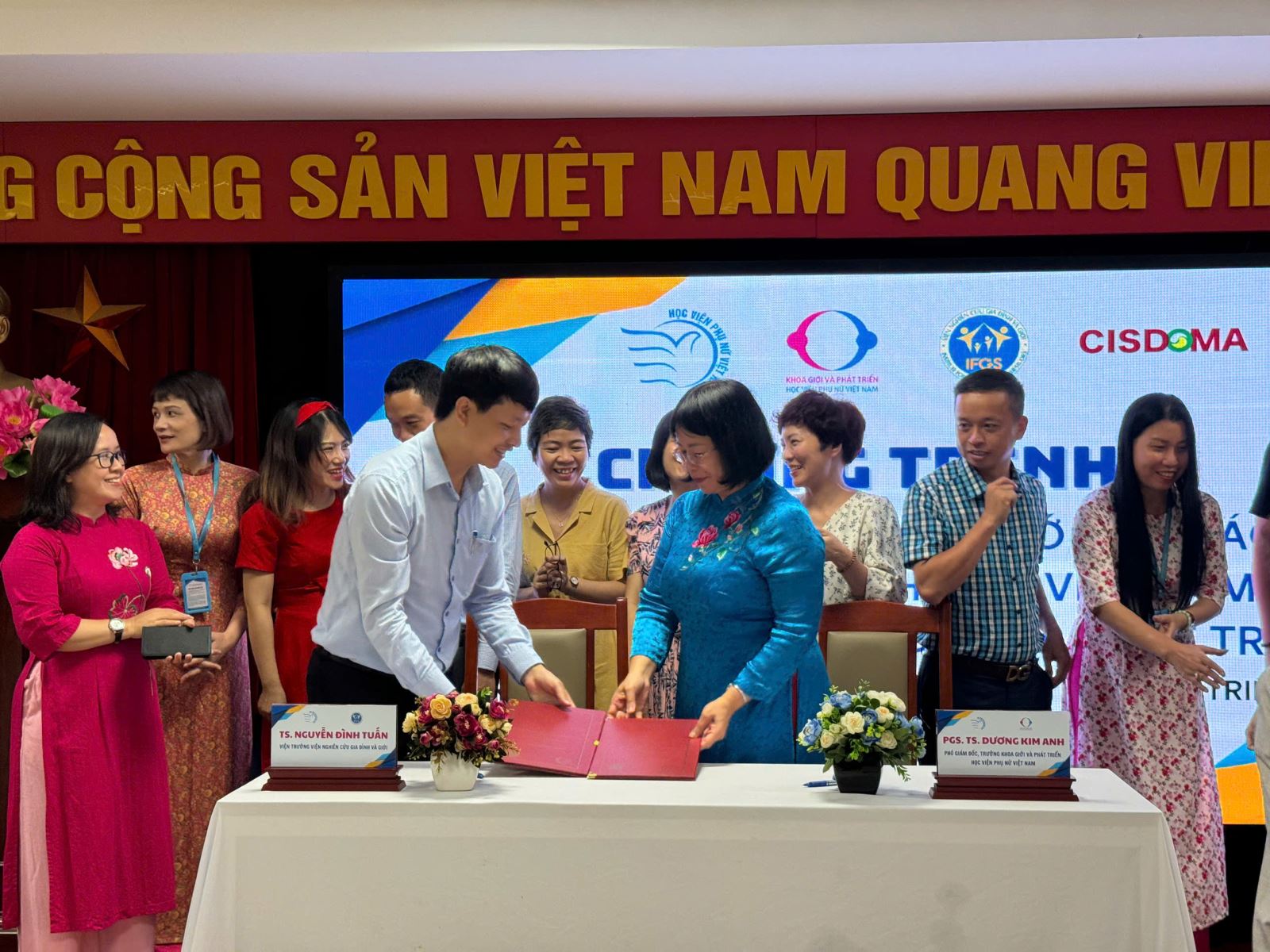 Lễ Ký kết biên bản ghi nhớ hợp tác giữa Học viện Phụ nữ Việt Nam với Viện Nghiên cứu Gia đình và Giới
Lễ Ký kết biên bản ghi nhớ hợp tác giữa Học viện Phụ nữ Việt Nam với Viện Nghiên cứu Gia đình và Giới
-
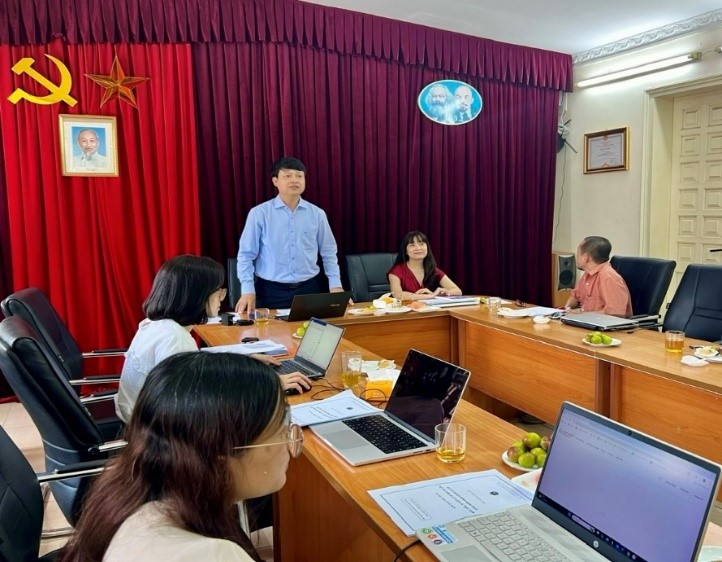 Hội thảo khoa học: "Bộ chỉ số gia đình hạnh phúc: Một số vấn đề lý luận và thực tiễn"
Hội thảo khoa học: "Bộ chỉ số gia đình hạnh phúc: Một số vấn đề lý luận và thực tiễn"
-
 Tọa đàm khoa học "Vận dụng lý thuyết trong nghiên cứu khoa học xã hội"
Tọa đàm khoa học "Vận dụng lý thuyết trong nghiên cứu khoa học xã hội"
-
 Hội nghị Đối thoại giữa Chi ủy, Lãnh đạo viện với đảng viên, viên chức và người lao động Viện nghiên cứu Gia đình và Giới 6 tháng đầu năm 2024
Hội nghị Đối thoại giữa Chi ủy, Lãnh đạo viện với đảng viên, viên chức và người lao động Viện nghiên cứu Gia đình và Giới 6 tháng đầu năm 2024
-
 Chi bộ Viện nghiên cứu Gia đình và Giới tổ chức sinh hoạt chuyên đề: Đoàn kết thống nhất trong Đảng theo tư tưởng Hồ Chí Minh
Chi bộ Viện nghiên cứu Gia đình và Giới tổ chức sinh hoạt chuyên đề: Đoàn kết thống nhất trong Đảng theo tư tưởng Hồ Chí Minh
-
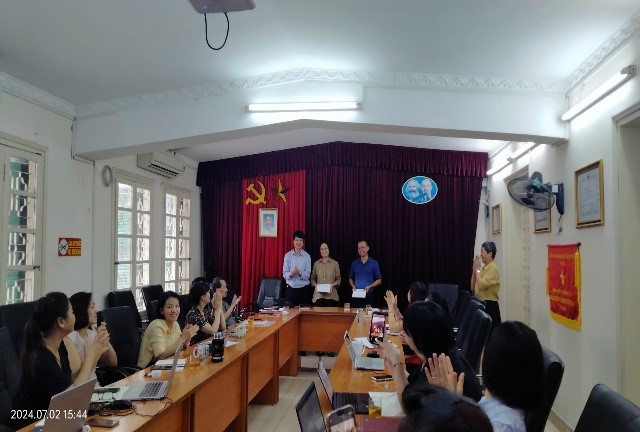 Cuộc thi “Nét đẹp và giá trị gia đình Việt Nam” hưởng ứng Ngày Gia đình Việt Nam 2024
Cuộc thi “Nét đẹp và giá trị gia đình Việt Nam” hưởng ứng Ngày Gia đình Việt Nam 2024
-
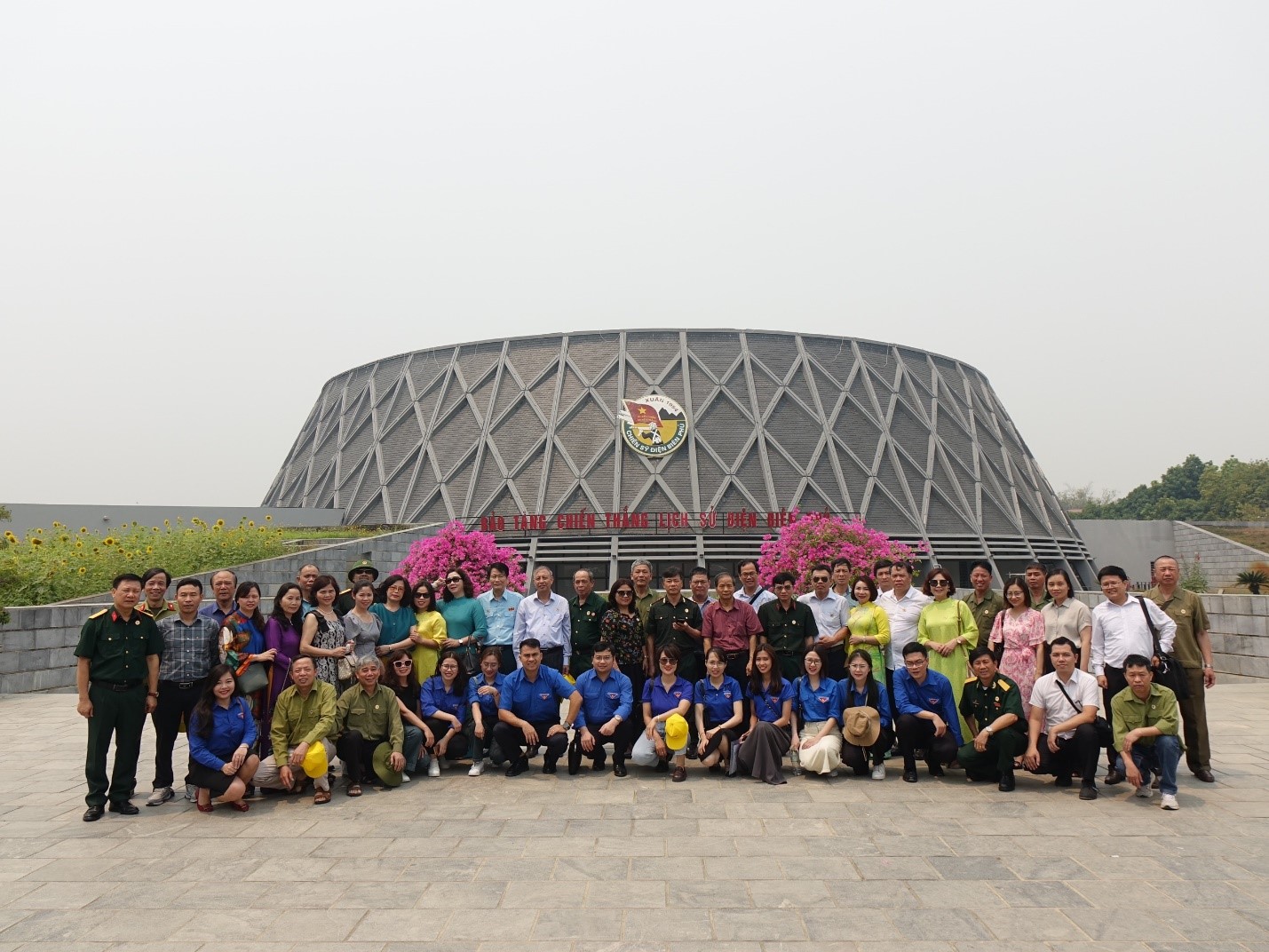 Hội Cựu chiến binh, Đoàn Thanh niên Viện Hàn lâm Khoa học xã hội Việt Nam đi thăm lại chiến trường xưa Điện Biên Phủ
Hội Cựu chiến binh, Đoàn Thanh niên Viện Hàn lâm Khoa học xã hội Việt Nam đi thăm lại chiến trường xưa Điện Biên Phủ
- Tổng mục lục Tạp chí 2023
-
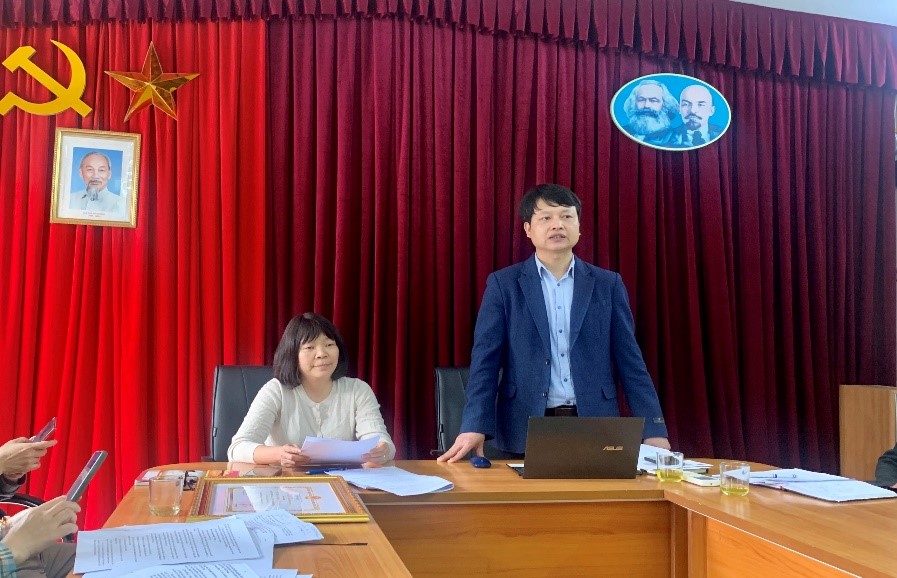 Viện nghiên cứu Gia đình và Giới phát động phong trào thi đua và ký Giao ước thi đua năm 2024
Viện nghiên cứu Gia đình và Giới phát động phong trào thi đua và ký Giao ước thi đua năm 2024
Liên kết web
Số lượt truy cập
23
5407463
Chi tiết tạp chíNo. 2 - 2016
On November the 14th 2016, as part of the Ministerial-level Program “Research and overall assessment of families in the period of industrialization, modernization and international integration” managed by Vietnam Academy of Social Sciences, the research team of the project “Middle class families in Vietnam and the economic, social and cultural development processes”, hosted by Vietnam Sociological Association organized a scientific conference “Some theoretical and methodological issues in studying middle class and middle class families in Vietnam”.
Attending the conference were Program Deputy Leader, Secretary and Project Leaders, representatives of Vietnam Sociological Association, the hosting organization, the Association President and Vice President, members of Standing Committee and Executive Committee of the Association, lecturers from National University in Hanoi, University of Social Sciences and Humanities in Hanoi, Ho Chi Minh National Academy of Politics and Public Administration, Academy of Journalism and Communication and researchers from Sociological Association, Vietnam Institute of Economics, Institute for Family and Gender Studies, Vietnam Economic Association and so on.
In addition to introductory reports by project leaders, 4 presentations at the conference touched on the issues relating to the middle class, middle class families and measurement method. Namely: 1) Middle class: history – present and transformation trend (by Prof. Dr. Nguyen Dinh Tan); 2) Method for identifying and measuring the middle class in Vietnam (by Dr. Do Thien Kinh): 3) Measuring the development of the middle class in Vietnam under economic approach (by Dr. Le Kim Sa); 4) The role and interactive relation between the middle class and economic, social and cultural development (by Assoc. Prof. Dr. Nguyen Xuan Mai).
The presentations are followed by an active discussion about theoretical and methodological issues in studying the middle class and middle class families in Vietnam at the time being. Some participants commented on the method used to measure the middle class, whether to use uni-dimensional or multi-dimensional approach, income benchmarks and occupational groups and so on.
There was a consensus that identifying and measuring the middle class, especially the middle class families in Vietnam, is not easy, therefore it is advisable to use a multi-dimensional approach to measure and identify the middle class and middle class families. Some participants recommended to use Max Weber’s theory of social stratification as the basis to identify and measure the middle class families under 5 dimensions, including wealth, political power, social credibility, market capacity and life chance. Especially, it is advised to select quantitative indicators which are currently used in the world, so that the research results can be compared.
The conference has provided a really good opportunity for scientists to exchange and share experience and theoretical and methodological knowledge needed to research the middle class and middle class families in Vietnam, a relatively broad and complicated theme.
As part of the ministerial-level focal program “Research and overall assessment of families in the period of industrialization, modernization and international integration (KX-16/19) hosted by Vietnam Academy of Social Sciences, the Institute for Family and Gender Studies (IFGS) held conferences on theoretical and methodological issues of 3 ministerial-level projects hosted by IFGS under the mentioned ministerial-level program. Attending the conferences were representatives of the leadership of the KX-16/19 program, project leaders, representatives of Scientific Management Board under Vietnam Academy of Social Sciences, key members involving in the component projects of the Program, researchers and lecturers from institutes and universities in Hanoi.
November 9th 2016: Project “Theoretical and methodological grounds of researching marriage”
The conference is part of the project “Main characteristics of marriage in Vietnam at present and influencing factors” (KHXH-G?/16-19/02) led by Prof. Dr. Nguyen Huu Minh.
Prof. Dr. Nguyen Huu Minh briefed participants on the objectives and contents of the project, including the formation of marriage, housing arrangement for couples after wedding, identifying marriage experience of couples, especially in the early stage of marriage, assessment of some aspects of marriage, assessment of the influence of economic, cultural and social conditions on marriage, forecasting the trend of marriage changes in the coming time in Vietnam and recommendations for policy directions regarding marriage.
The project will focus on researching marriage characteristics in Vietnam at the time being, including marital status, times of getting married, consanguineous marriages, looking for and choosing partners, criteria for choosing partners, decision makers in marriage, the way to make marriage decision, marriage age and housing arrangement after wedding, average age of first marriage, age of early marriage, perceptions on couples living with or without parents, experience and quality of marriage, the way husband and wife behave to each other, couple’s emotional life, mishaps in marital life and responses, satisfaction/dissatisfaction about marriage, sharing time and activities between husband and wife.
At the conference, the following presentations were delivered:
(1) Some approaches to researching marriage presented by Prof. Dr. Nguyen Huu Minh, Director of the IFGS
(2) Living arrangement after wedding under the cultural ecological perspective and implication to the research of living arrangement after wedding in Vietnam by Assoc. Prof. Dr. Nguyen Tuan Anh, Faculty of Sociology, Ha Noi University of Social Sciences and Humanities;
(3) Some issues relating method to measure marriage quality by Assoc. Prof. Dr. Phan Thi Mai Huong, Institute for Psychology;
(4) Assessing and measuring marriage quality (from some research in the world) by Dr. Vu Thi Thanh, Institute of Human Studies;
(5) Some methodological issues of researching consanguineous marriages in Vietnam by Dr. Nguyen Duc Manh, Institute for Population, Family and Children Studies.
November 10th 2016: Theme “Theoretical approach and measurement scale in studying family values”
The conference was part of the project “Fundamental values of Vietnamese families at present” (KHXH-G?/16-19/10) led by Dr. Tran Thi Minh Thi.
The conference helps identify fundamental values of families and factors which influence fundamental values of Vietnamese families at present, thus revealing some trends in the transformation of family fundamental values in the coming time. The conference focused on clarifying theoretical and practical grounds of family fundamental values, such as significance of marriage and family, perception and individual attitude toward economic, psychological, emotional aspects, children, family relationships and influencing factors under traditional and modern dimensions of Vietnamese family values at present, therefore forecasting some stereotypes of family values in the coming time and making some policy recommendations in order to bring into full play fundamental values of Vietnamese families.
The report by Dr. Tran Thi Minh Thi, project leader was followed by other presentations:
(1) “Value of husband-wife, parent-children, immediate family-extended family, family-community relations at present- some initial theoretical understanding and measurement scale” by Assoc. Prof. Dr. Tran Thi An – Head of the Scientific Management Board, Vietnam Academy of Social Sciences.
(2) Family values in Vietnam under theoretical and methodological perspectives – Assoc. Prof. Dr. of Sciences Luong Dinh Hai –Director of the Institute for Human Studies;
(3) Economic values of families at present: concept, theory and measurement indicators – Prof. Dr Le Ngoc Hung – Vice Director of the Institute of Sociology, Ho Chi Minh National Academy of Politics.
(4) Some methodological dimensions in researching family values by Prof. Dr. Trinh Duy Luan, Vietnam Sociological Association;
(5) Theory and measurement scale of marriage and family significance – M.A. Tran Quy Long, IFGS.
November 11th 2016: Theme “Some theoretical and methodological issues in studying domestic violence”.
The conference was part of the project “Influences of social and economic environments on domestic violence at present” (KHXH-G?/16-19/04) led by Dr. Dang Thi Hoa
In recent years, many scientists and social activists show their interest in the studies on domestic violence. Domestic violence is reported in many countries and territories, regardless of geographical locations, ethnic groups or level of social development. Forms of domestic violence are diverse and complicated. In Vietnam, domestic violence is becoming a pressing social issue. The acts of violence are obvious, but the causes of violence should be clarified. Domestic violence tends to become more severe, target more victims and become increasingly complicated. The conference aims to clarify theoretical and practical grounds of domestic violence in Vietnam, find approach and methodology to research and measure domestic violence and factors influencing domestic violence.
The report by Dr. Dang Thi Hoa, project leader was followed by presentations:
(1) “Issues to be dealt with when researching domestic violence in Vietnam at present” by Dr. Tran Tuyet Anh, Head of Family Department, Ministry of Culture, Sport and Tourism;
(2) “Domestic violence under the perspective of culture, structure and social actions” by Assoc. Prof. Le Ngoc Van, IFGS;
(3) “Some theories to be applied to researching domestic violence” M.A. Dang Bich Thuy – IFGS;
(4) “Some approaches to researching domestic violence in the world” by Dr. Duong Kim Anh, Vietnam Women's Academy;
(5) "Some notes relating to the framework for analyzing and measuring in researching domestic violence" - Prof. Dr. Nguyen Huu Minh - Director of IFGS.
The conferences have provided a good opportunity for scientists to exchange and share experience and knowledge about theory and methodology for the 3 research themes, including marriage, fundamental family values at present and domestic violence in Vietnam and in the world. Outcomes of the conferences will help provide theoretical and methodological grounds for the research and overall assessment of Vietnamese families in the period of industrialization, modernization and international integration.
Mid-term Conference on Ministerial-level and Institute-level Scientific Projects 2016
On September 22nd and 23rd 2016, as part of its annual scientific activities in 2016, Institute for Family and Gender Studies held a mid-term scientific conference in Hanoi to present outcomes and progress of ministerial-level and institute-level scientific research projects hosted by IFGS.
The conference was divided into 4 sessions with 4 themes, including women studies, children studies, family studies and gender studies. The first session presided over by Assoc. Prof. Dr. Nguyen Huu Minh touched on 4 specific themes, including Women’s role in housework (presented by Dr. Tran Thi Hong), Woman’s role in traditional craft villages – research was carried out in two traditional craft villages in Hanoi (presented by M.A. Nguyen Duc Tuyen), some theoretical issues in studying single women (presented by M.A. Vu Thi Cuc)
The second session presided over by Dr. Tran Thi Minh Thi presented reports on children studies, including the annual report 2016: caring for children in Vietnamese families at present (by M.A. Le Ngoc Lan); the quality change in the population under 6 years in the period 2000-2015: through analyzing some national surveys (presented by M.A. Tran Quy Long); and the children’s rights in their families in Vietnam: studying the children aged from 10 to 17 years (presented by M.A. Dang Bich Thuy).
The third session presided over by Assoc. Prof. Dr. Le Ngoc Van touched on family issues, starting from the ministerial-level research on the relations between extended family and immediate family life in Vietnam rural areas through 30 years of renovation, led by Assoc. Prof. Nguyen Huu Minh. It was followed by two institute-level research, including the research on the role of the eldest child in a family in the Northern plain (Research was carried out in the village Dam Quan, Ha Bang, Thach That district, Hanoi) which is led by M.A. Le Thi Hong Hai and the research on the transformation of psychological and sentimental functions of families in the world and in Vietnam, which is led by M.A. Nguyen Ha Dong.
The last session presided over by Dr. Dang Thi Hoa shared the outcomes which have been achieved so far in the research on gender carried out by M.A. Bui Thi Huong Tram (Influence of husband and wife relations on the woman’s perception on happiness- research was carried out in Ninh Binh province), and the research by M.A. Tran Thi Thanh Loan (Division of labor and the right to make decisions among husband and wife in ethnic minority families); and the research by M.A. Tran Thi Cam Nhung (age of first marriage and some influencing factors through analyzing some surveys)
Basing on the comments and suggestions of the participants, leaders of the ministerial and institute-level projects will continue to improve the content and fulfill the remaining tasks of their research. Commenting on the overall progress and outcomes of the projects, Assoc. Prof. Dr. Nguyen Huu Minh, Director of Institute for Family and Gender Studies said that despite difficulties and challenges, research teams had basically done their good jobs and kept up with the committed schedule. He also believed that comments and suggestions by the participants were really useful for project leaders to improve research quality and would lay foundation for scientific research of IFGS in the coming years.
Changes in Personal Values, Family Values and Youth’s Premarital Sex - Hanoi Case
Having sex before marriage in Vietnamese young people tends to increase. In addition to the factors of environment, friends, schools, the media, the openness of Western culture, there are also other factors that influence the attitude and sexual behavior change of the youth. The study examines the impact of personal values, family values on that change and put them in relation to other factors. The result of this study shows that personal values and family values as the basic contents of traditional values and Confucianism values continues to have an impact on young people’s attitudes and their sexual behavior before marriage.
Overview of Early Childhood Education in Vietnam: From a Gender Perspective
Comprehensive Early Childhood Education (ECE) has been a priority policy of Vietnam’s Government in recent decades. The Government has issued a number of ECE policies in order to develop a preschool network and child mobilization including policies for ethnic minorities and disadvantaged children. While positive changes have been made over the years such as an increased rate of enrollment, diversified models of ECE services and improved ECE curricula, a number of issues remain. There is limited access to ECE services, particularly for poor, ethnic minority and disadvantaged children; poor quality of services, especially in small and non-registered ECE service/establishments and a low rate of enrollment of children under three years old. This paper indicates gaps in terms of adequate ECE policies, service management, stakeholder involvement and policies related to ECE teachers and caregivers.
Care for the Elderly: a Theoretical Review
This paper aims to review recent theoretical discussions on elderly care and key subject powers and application to Vietnam, including (i) care diamond; (ii) state, market, family, and community in elderly care; (iii) attachment theory, (iv) social exchange theory; and (v) role of norms, obligations and social identities in Asian context. In a Vietnam’s transitional context, according to the author, elderly care regime is in the process of learning new experiences while building its own principles since its population has just entered to aging process. Rural-urban migration and other demographic and social changes such as more women in the labor force, higher divorce rates, decreasing birth rates, and changing family structures, have led to the increasing number of left-behind elderly in the rural villages, raising an increasing attention both from a theoretical perspective and practical research. Furthermore, it is significant in the Vietnamese society that a considerable number of old parents provide support to their children and living independently.
This paper presents the results of the analysis of gender aspects in early childhood development regarding following aspects: 1) Adults’ support to children’s learning; 2) Children’s access to books from an early age. The analysis was conducted using data from the Vietnam Multiple Indicator Cluster Surveys (MICS) 2006, 2011 and 2014. It is shown that adult members’ involvement in four or more activities promoting children’s learning and school readiness was quite high. Fathers’ involvement in supporting early childhood education was much lower than mothers. The availability of children’s books in families remained low. No significant gender differences in having access to three or more children’s books were observed. In general, affluent families and better educated mothers were more likely to participate in four or more activities promoting boys’ and girls’ learning and to have more access to three or more children’s books. Boys from ethnic minority-headed households were less likely to receive adults’ involvement in four or more activities promoting their learning and school readiness compared to boys from Kinh-headed households. Girls from families who had two or more children under 5 or girls from ethnic minority-headed households, were less likely to have access to three or more children’s books than those living in families who had only one child under 5, and who lived in Kinh-headed households. There were stark differences among regions with regard to having access to three or more children’s books.

